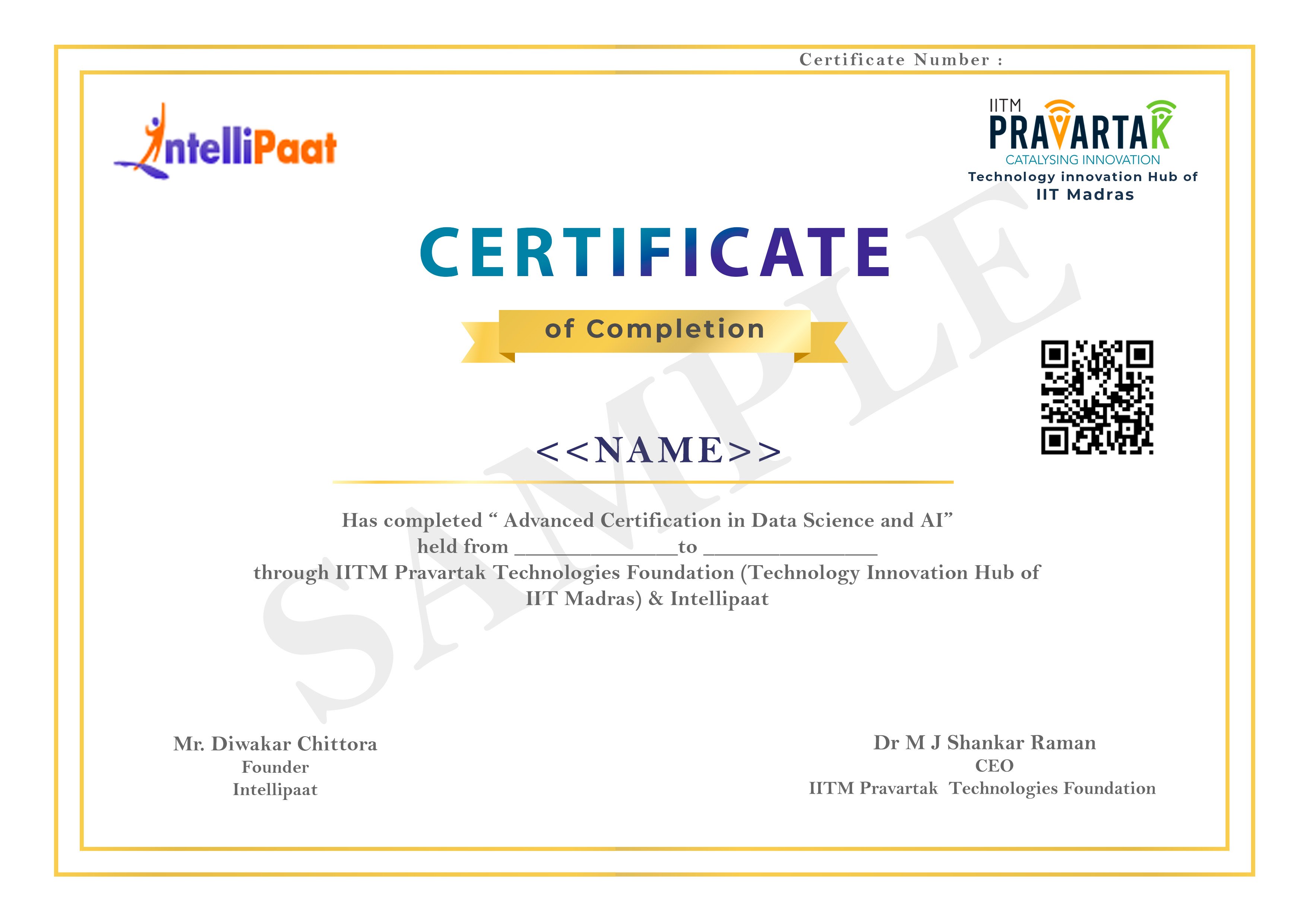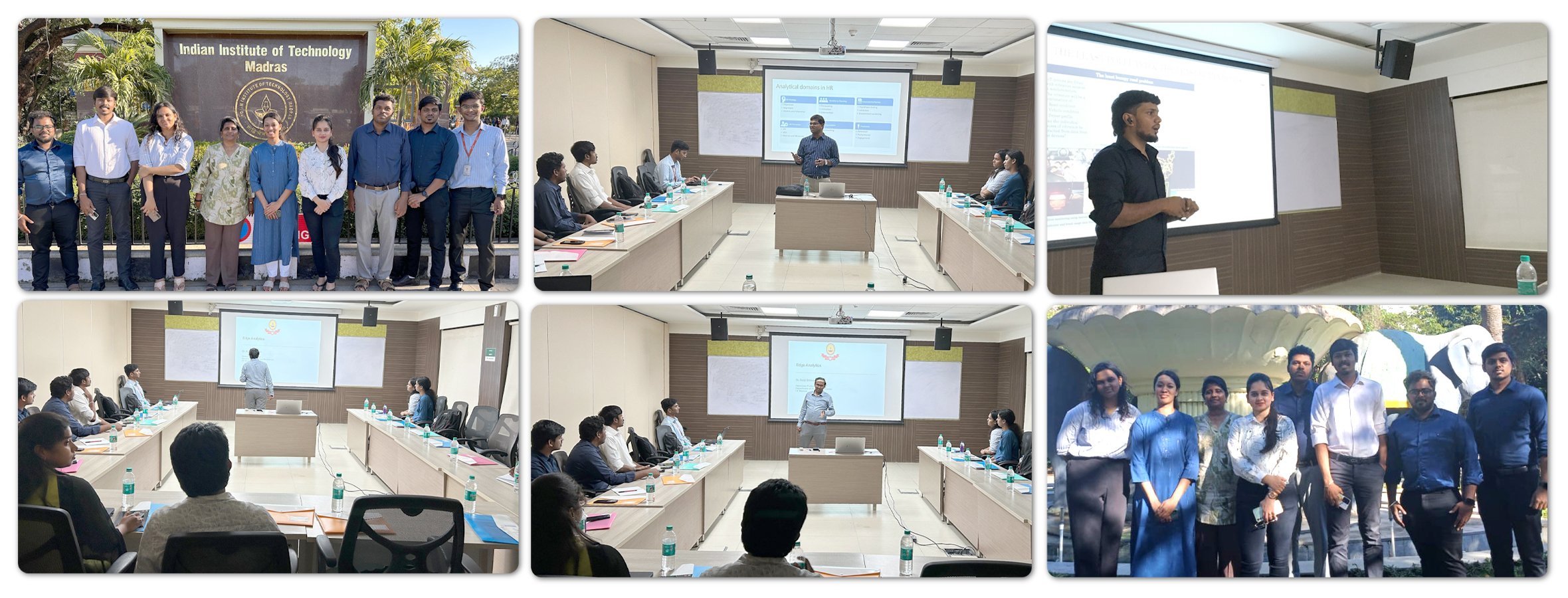Your cart is currently empty.
Master the skills of Machine Learning & Artificial Intelligence with this advanced certification in Data Science and Artificial Intelligence by IITM Pravartak (A Technology Innovation Hub of IIT Madras) & Intellipaat. You will get to learn from the IIT Madras Data Science Faculty & industry experts. The advanced online boot camp features 1:1 mentorship by Intellipaat instructors. Be a part of 2 days campus immersion at IIT Madras upon course completion.

Watch
Course PreviewBatch
50
Learning Format
Online Bootcamp
Live Classes
7 Months
Campus Immersion
at IIT Madras Pravartak
IITM Pravartak
Certification
This Data Science and Artificial Intelligence certification course taught by IIT Madras faculty and industry experts aims to help you master all the basic and advanced level skills that are crucial in the fields of Data Science, ML, Deep Learning, and AI.
About IIT Madras Pravartak Digital Skills Academy
IIT Madras Pravartak, a Technology Innovation Hub of IIT Madras is funded by the Department of Science and Technology, GoI under its National Mission on Interdisciplinary Cyber-Physical Systems (NM-ICPS), focuses on application-oriented research and innovation in the areas SNACS. BharOS, India’s first mobile operating system is developed by an IIT Madras Pravartak incubatedRead More..
Key Achievements of IIT Madras:
55% Average Salary Hike
45 LPA Highest Salary
12000+ Career Transitions
400+ Hiring Partners
Career Transition Handbook
*Past record is no guarantee of future job prospects
Understand the issues and create models based on the data gathered, and also manage a team of data scientists.
Build strategies on frameworks and technologies to develop AI solutions and help the organization prosper.
With the help of several machine learning tools and technologies, build statistical models with huge chunks of business data.
Design and build machine learning models to derive intelligence for the numerous services and products offered by the organization.
Create and manage pluggable service-based frameworks that are customized in order to import, cleanse, transform, and validate data.
Extract data from the respective sources to perform business analysis, and generate reports, dashboards, and metrics to monitor the company’s performance.
Skills to Master
Python
Data Science
Data Analysis
AI
Data Wrangling
SQL
Story Telling
Machine Learning
Prediction algorithms
NLP
Model
Data visualization
Tools to Master
Python
SQL Basics –
Advanced SQL –
Deep Dive into User Defined Functions
SQL Optimization and Performance
Data Handling with NumPy
Data Manipulation Using Pandas
Data Preprocessing
Data Visualization
Descriptive Statistics –
Probability
Inferential Statistics –
Linear Algebra –
Introduction to Machine Learning
Regression
Classification
Clustering
Supervised Learning
Unsupervised Learning
Artificial Intelligence Basics
Neural Networks
Deep Learning
The Data Science capstone project focuses on establishing a strong hold of analyzing a problem and coming up with solutions based on insights from the data analysis perspective. The capstone project will help you master the following verticals:
Power BI Basics
DAX
Data Visualization with Analytics
Hands-on Exercise:
Creating a dashboard to depict actionable insights in sales data.

Admission Details
The application process consists of three simple steps. An offer of admission will be made to selected candidates based on the feedback from the interview panel. The selected candidates will be notified over email and phone, and they can block their seats through the payment of the admission fee.
Submit Application
Tell us a bit about yourself and why you want to join this program
Application Review
An admission panel will shortlist candidates based on their application
Admission
Selected candidates will be notified within 1–2 weeks
Total Admission Fee
EMI Starts at
We partnered with financing companies to provide very competitive finance options at 0% interest rate
Financing Partners
![]()
Admissions close once the required number of students is enrolled for the upcoming cohort. Apply early to secure your seat.
| Date | Time | Batch Type | |
|---|---|---|---|
| Program Induction | 28th Sep 2025 | 08:00 PM IST | Weekend (Sat-Sun) |
Upon completion of the Data Science and Artificial Intelligence Course training you will receive a joint Advanced Certification in Data Science and Machine Learning from Intellipaat and IIT Madras Pravartak.
Intellipaat provides career services for all the learners enrolled in this course. IITM Pravartak is not responsible for career services.
Intellipaat career services for this program contains resume building and review of linkedin profile.
This AI Course and Data Science Course is conducted by leading experts from IIT Madras Pravartak and Intellipaat who will make you proficient in these fields through online video lectures and projects. They will help you gain in-depth knowledge in Artificial Intelligence and Data Science, apart from providing hands-on experience in these domains through real-time projects.
After completing the Data Science and Artificial Intelligence course and successfully executing the assignments and projects, you will gain an Advanced Certification in Data Science and Machine Learning from Intellipaat and IIT Madras Pravartak which will be recognized by top organizations around the world.
You can receive IBM courses worth of Rs. 13,000 with this program. You can speak to the course advisor for the same.
If you fail to attend any of the live lectures, you will get a copy of the recorded session in the next 12 hours. Moreover, if you have any other queries, you can get in touch with our course advisors or post them on our community.
There will be a two-day campus immersion module at IIT Madras Pravartak during which learners will visit the campus. You will learn from the faculty as well as interact with your peers. However, this is subject to the COVID-19 situation and guidelines provided by the institute. The cost of travel and accommodation will be borne by the learners. However, the campus immersion module is optional.
Please note that the course fees is non-refundable and we will be at every step with you for your upskilling and professional growth needs.
Due to any reason you want to defer the batch or restart the classes in a new batch then you need to send the batch defer request on [email protected] and only 1 time batch defer request is allowed without any additional cost.
Learner can request for batch deferral to any of the cohorts starting in the next 3-6 months from the start date of the initial batch in which the student was originally enrolled for. Batch deferral requests are accepted only once but you should not have completed more than 20% of the program. If you want to defer the batch 2nd time then you need to pay batch defer fees which is equal to 10% of the total course fees paid for the program + Taxes.
Yes, Intellipaat certification is highly recognized in the industry. Our alumni work in more than 10,000 corporations and startups, which is a testament that our programs are industry-aligned and well-recognized. Additionally, the Intellipaat program is in partnership with the National Skill Development Corporation (NSDC), which further validates its credibility. Learners will get an NSDC certificate along with Intellipaat certificate for the programs they enrol in.
What is included in this course?
 Click to Zoom
Click to Zoom














